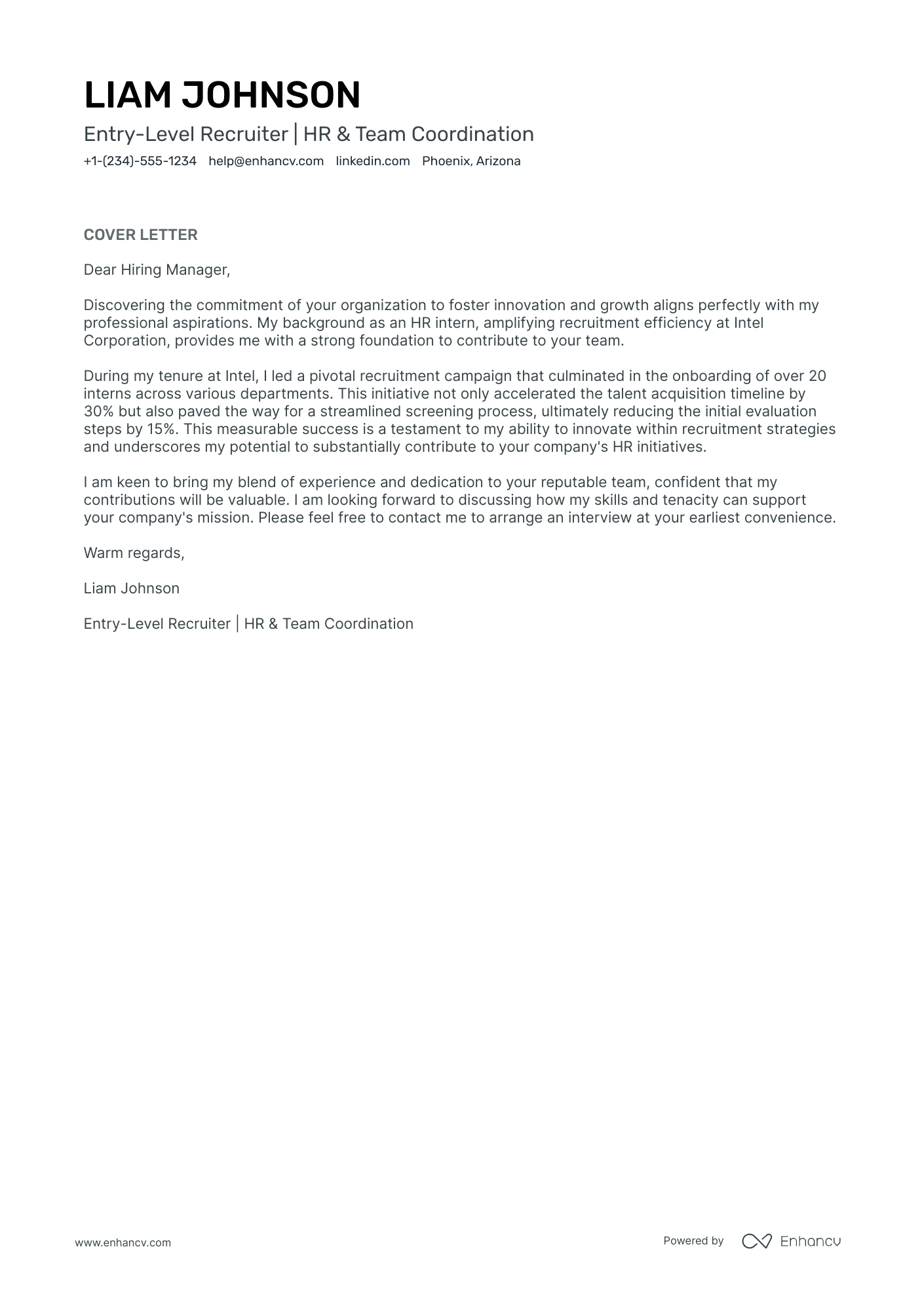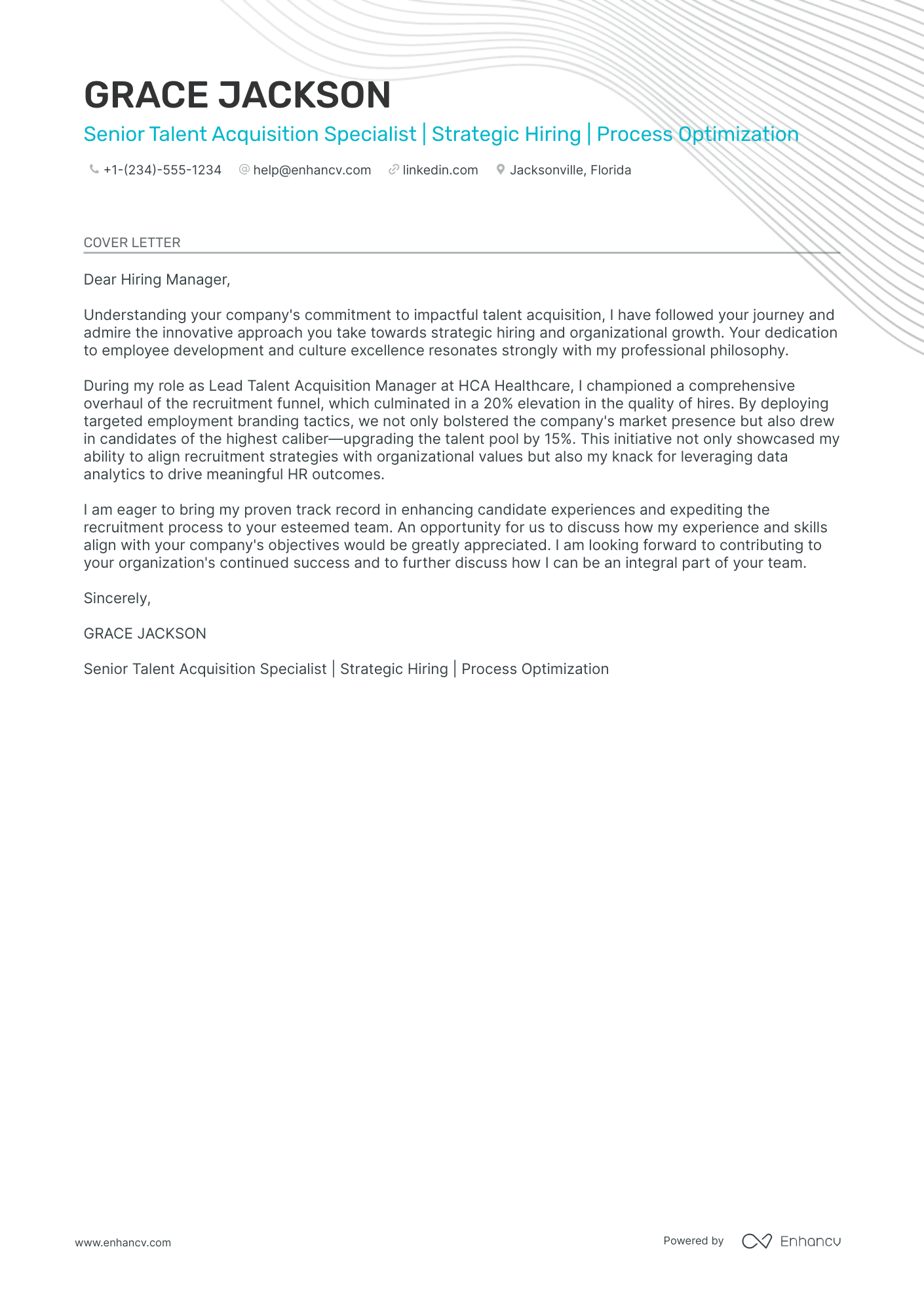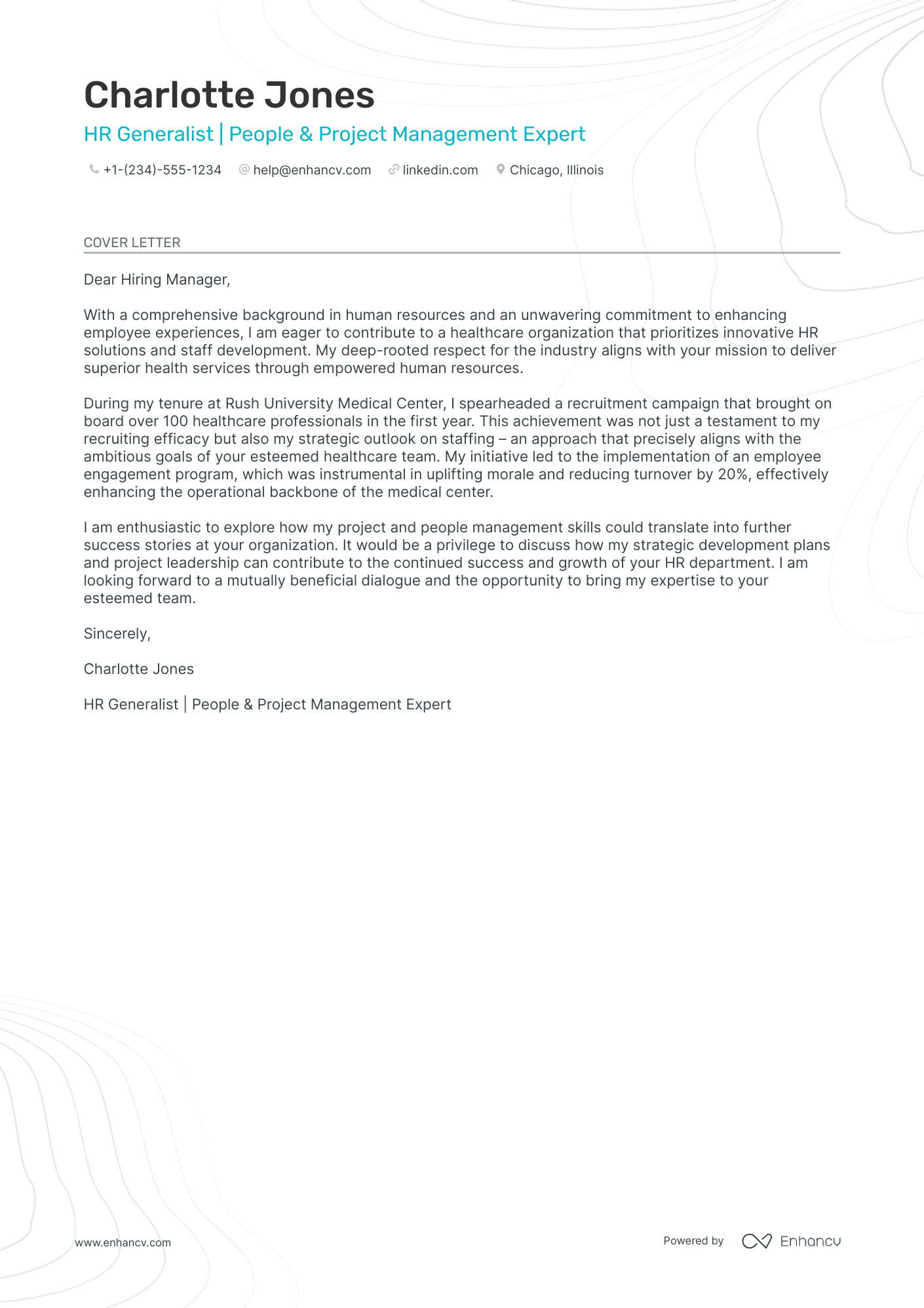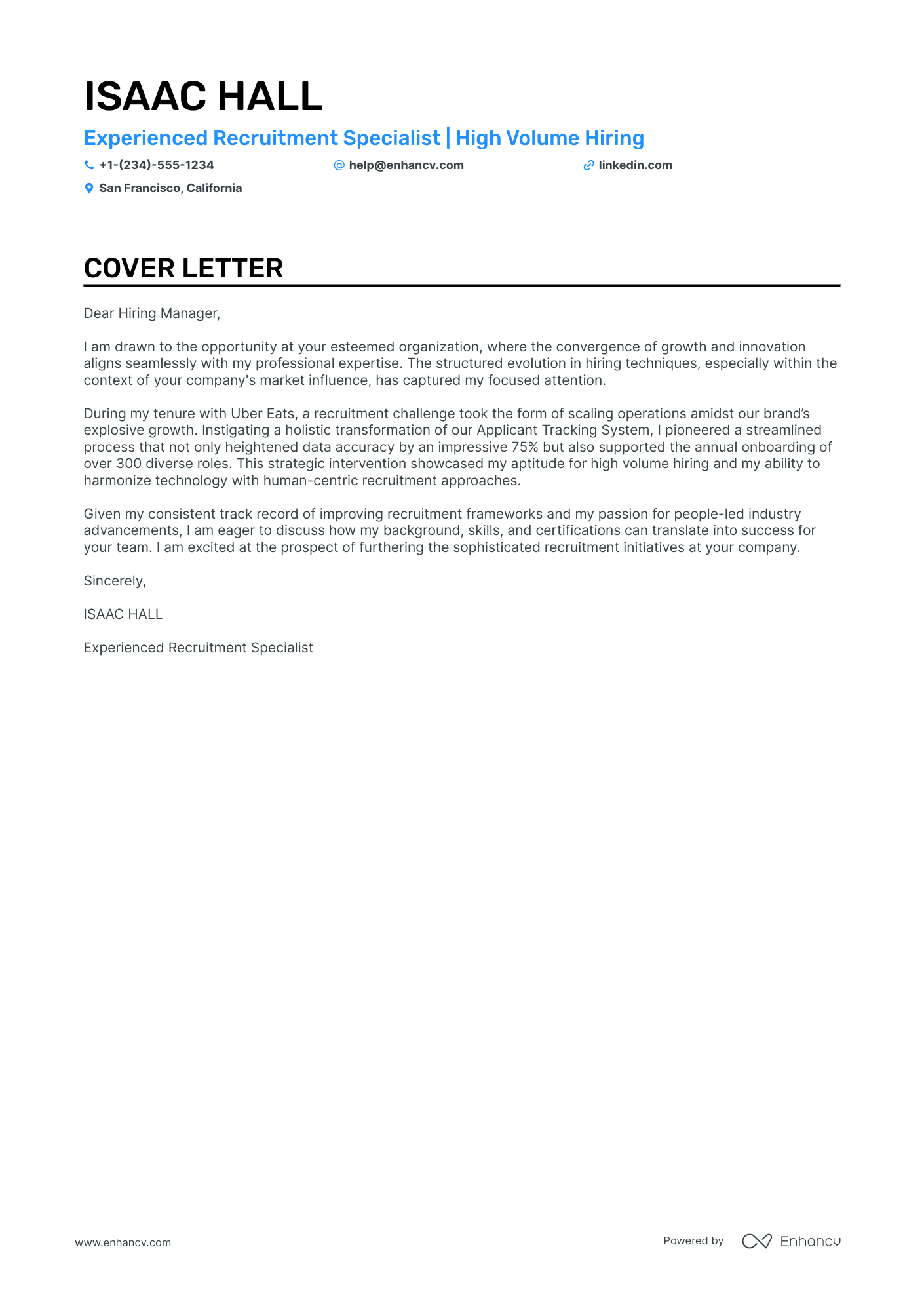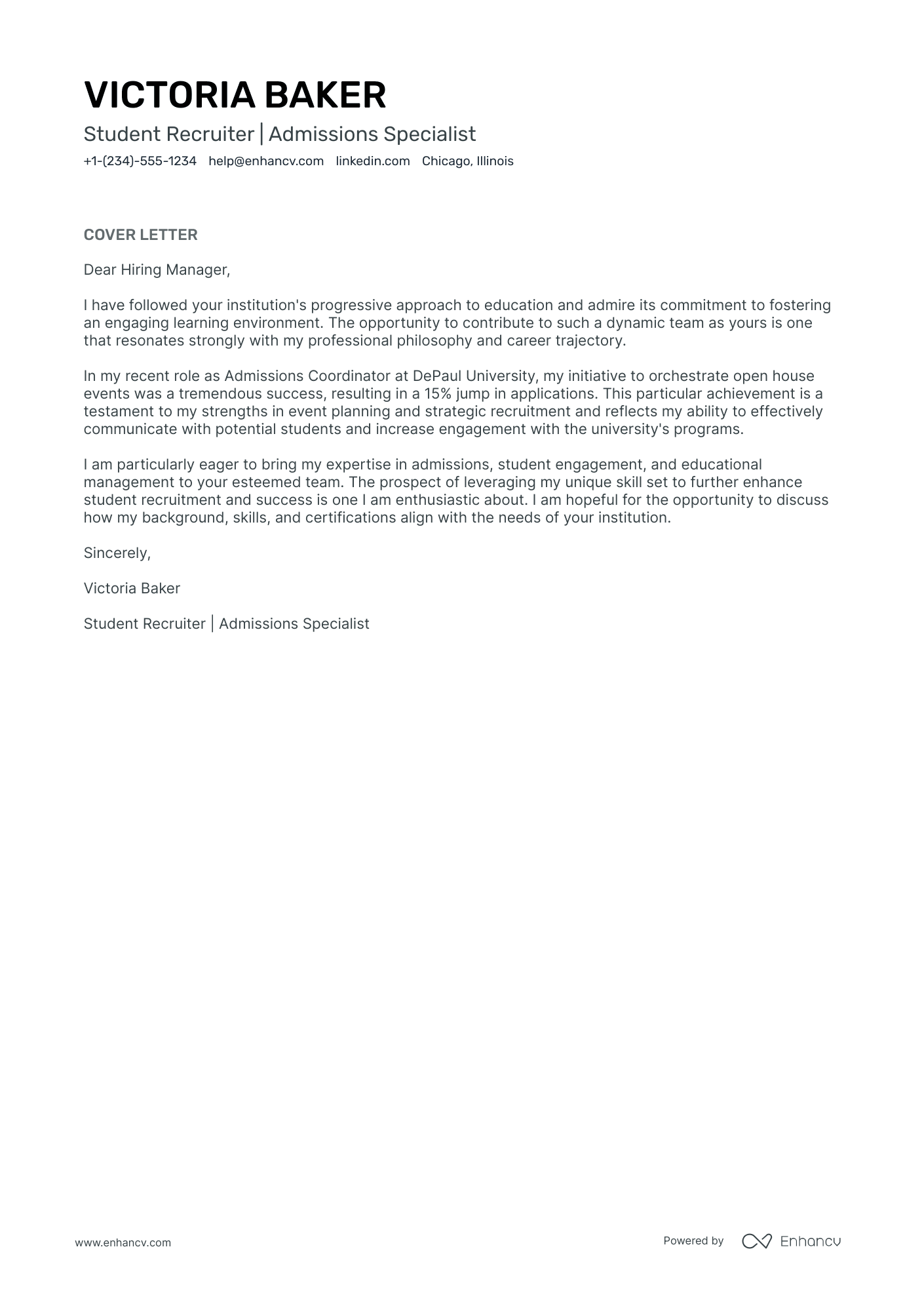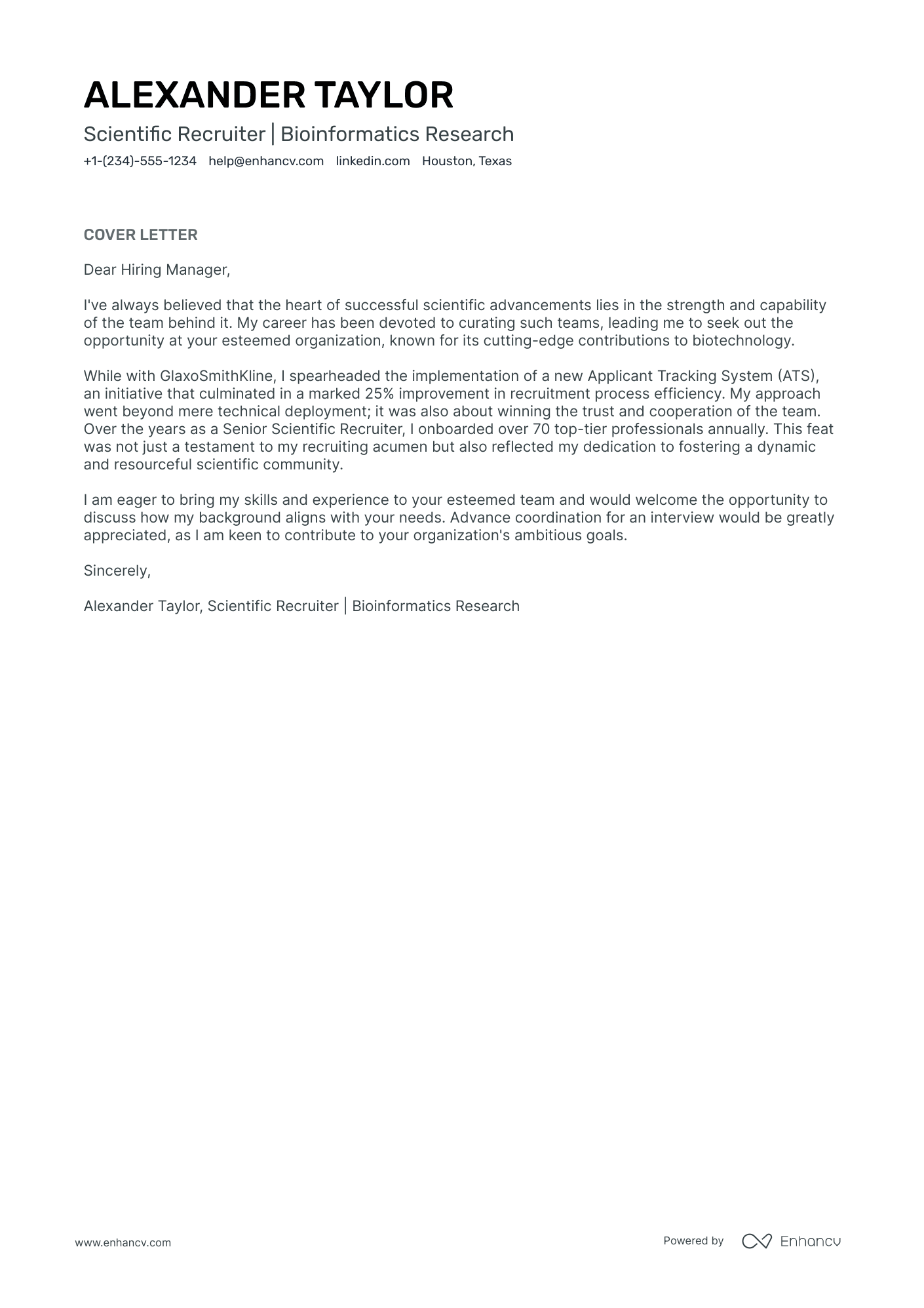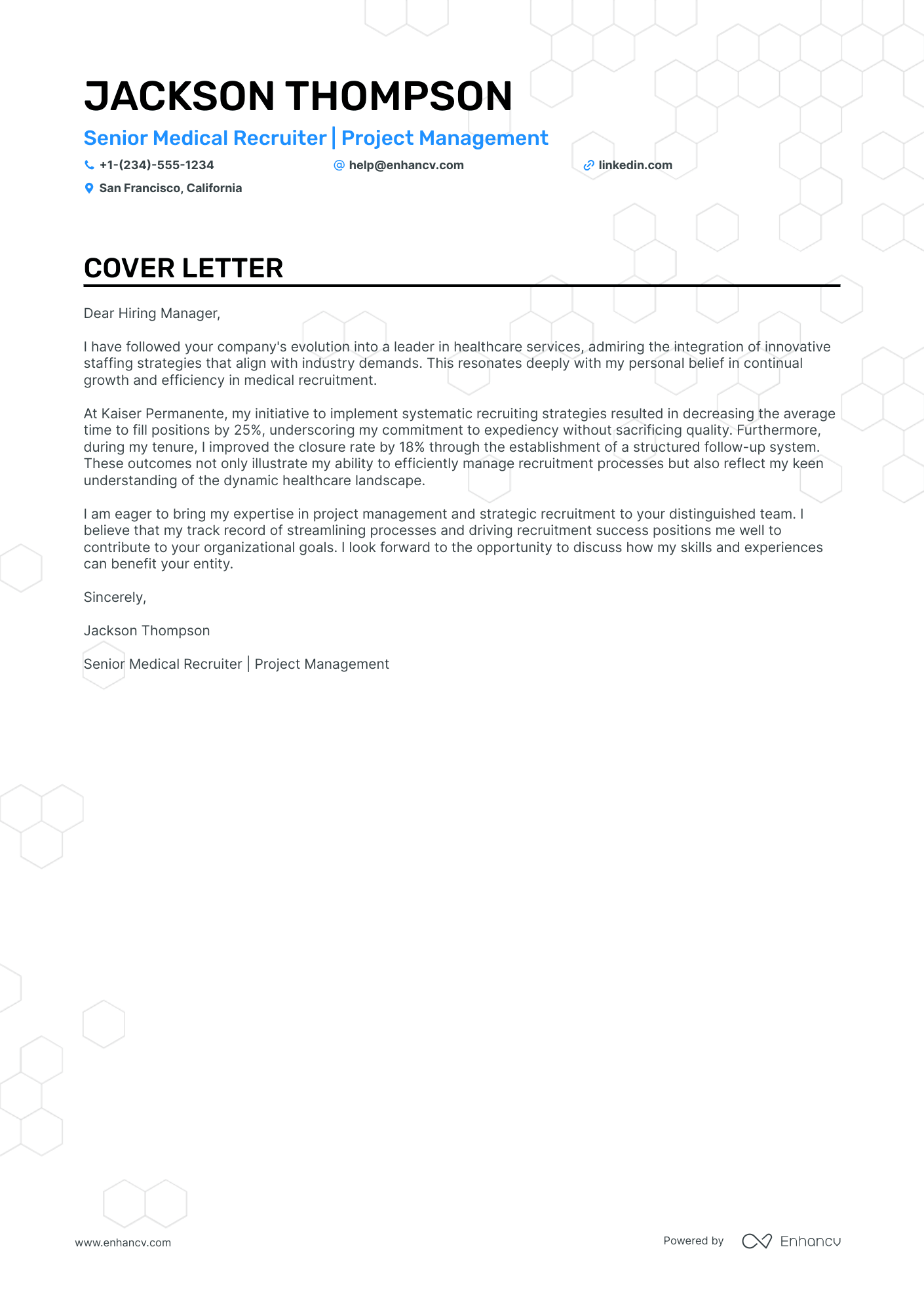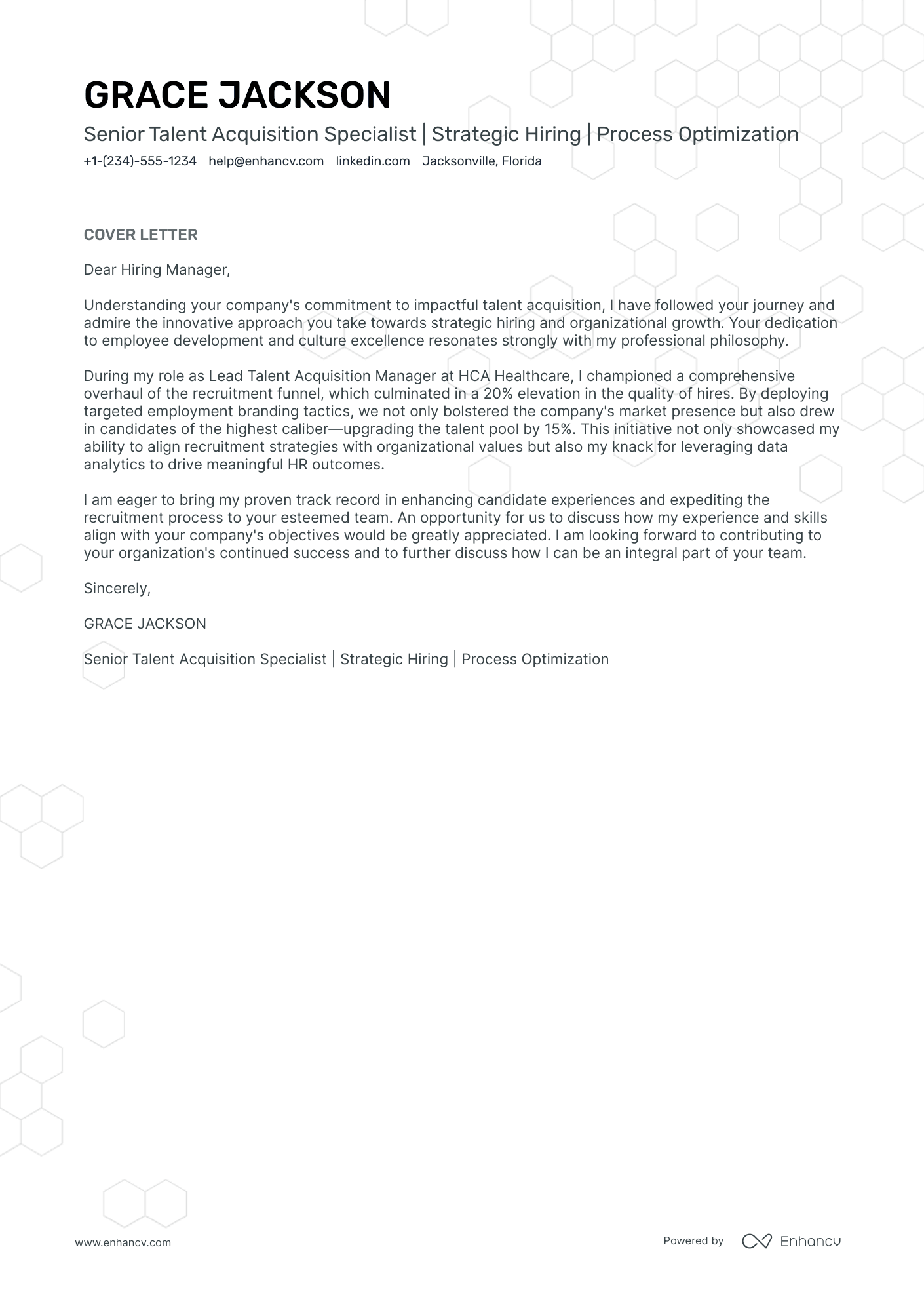Embarking on your job hunt, you've diligently submitted applications, only to discover that a standout recruiter cover letter is a crucial next step. Rather than rehashing your resume, your cover letter should spotlight a singular, shining professional triumph, weaving a tale of how you reached that pinnacle. Striking a balance between a formal tone and refreshing originality—dodging overused phrases—is key. Moreover, conciseness is your ally; keep your narrative within the span of a single, impactful page.
- Step your best foot forward in the recruiter cover letter introduction;
- Be inspired by other professionals' certified cover letters;
- Structure your recruiter cover letter to feature what matters most;
- Close off your recruiter cover letter to make a memorable impression on recruiters.
But where to start writing? Upload your resume into Enhancv's AI, which will prepare your recruiter cover letter (all you need to do is personalize it, and you'll be good to go).
If the recruiter isn't exactly the one you're looking for we have a plethora of cover letter examples for jobs like this one:
Drop your resume here or choose a file.
PDF & DOCX only. Max 2MB file size.
Recruiter cover letter example
Henry Jackson
Indianapolis, Indiana
+1-(234)-555-1234
help@enhancv.com
- Quantifiable Achievements: Including specific metrics, such as increasing the hiring rate by 25% and boosting report generation efficiency by 35%, effectively demonstrates the candidate's impact and competency in talent acquisition.
- Relevant Experience: Mentioning the experience within the healthcare sector and the use of CRM and ATS systems highlights industry-specific knowledge and familiarity with essential recruitment tools, which are crucial for the role.
- Leadership and Innovation: Describing the pioneering of new strategies and the revamping of current systems showcases the candidate's leadership qualities and capability to innovate, which are valuable in driving the company's recruitment success.
- Focus on Relationship-Building: Emphasizing on relationship-building, alongside technical abilities, stresses the candidate's understanding of the importance of interpersonal skills in talent acquisition and retention.
What should your recruiter cover letter look like - formatting and organizing your information
Have you ever wondered what are the must-have sections you need to include in your recruiter cover letter? Our builder sets those up for you with:
- Header - dedicated to your contact information, the role you're applying for, and the date (don't forget to include your name);
- Greeting and opening paragraph - to create a personalized and memorable experience for recruiters;
- Body paragraph - emphasizing your skill set and knowledge that aligns with the role and helps you to stand out;
- Closing paragraph - leaving a great impression and ending with an optional signature.
Use a cover letter template to discover the best formatting for your recruiter cover letter: that is single-spaced paragraphs and wrapping your content in a one-inch margin.
Ensure that both your resume and recruiter cover letter are in the same font. Stand apart from the crowd by using modern, yet simple fonts, like Chivo and Rubik, instead of the overused Arial and Times New Roman.
Did you know that the Applicant Tracker System (or ATS) won't be assessing your recruiter cover letter? Instead, submit your profile in PDF to recruiters to keep the same formatting and the design intact.
Maximize your efficiency! With our free cover letter generator, you’ll have a great letter in moments.
The top sections on a recruiter cover letter
- Header: This section includes your contact information, the date, and the employer’s details, making it easy for the recruiter to know who you are and how to contact you.
- Greeting: Personalize this with the recruiter’s name if possible, as this demonstrates attention to detail and a personalized approach, traits valued in a recruiting role.
- Introduction: Highlight your interest in the recruiting field and any relevant experience right at the start to immediately grab the recruiter’s attention.
- Body: Detail your experience in sourcing candidates, managing stakeholders, and your understanding of recruitment processes, as these are key responsibilities for a recruiter and what the hiring manager will be looking for.
- Closing: End with a call-to-action that reflects your proactive approach, thanking them for considering your application and suggesting a follow-up meeting or call to discuss how your skills align with the recruiter role.
Key qualities recruiters search for in a candidate’s cover letter
- Strong communication and interpersonal skills: Essential for engaging with candidates and hiring managers, building relationships, and effectively conveying information and feedback.
- Proficiency in recruitment software and applicant tracking systems (ATS): Needed to manage recruitment pipelines, track candidate progress, and leverage technology for efficient hiring processes.
- Excellent interviewing skills: To assess candidates thoroughly and ensure the right fit for the position and the organization.
- Networking capabilities: To establish and maintain a pool of potential candidates, connect with industry professionals, and stay informed about job market trends.
- Negotiation and decision-making skills: Important for extending offers, mediating between candidate expectations and company policies, and making sound hiring choices.
- Knowledge of employment law and HR best practices: To ensure compliance with legal standards throughout the recruitment process and advise on any HR-related matters.
How to personalize your recruiter cover letter greeting
Before you start writing your recruiter cover letter, take the time to find out who is recruiting for the role.
Search for the recruiter's name on LinkedIn or the corporate website to address them personally in your recruiter cover letter salutation.
What if you can't find out who's recruiting for the role?
Always aim to avoid the very impersonal "Dear Sir/Madam" - instead, opt out for "Dear HR Team" or "Dear Hiring Manager" to make a better first impression.
List of salutations you can use
- Dear [Hiring Manager's Name],
- Dear [Interview Panel],
- Dear [Company Name] Team,
- Dear Mr./Ms. [Last Name],
- Dear [Department] Hiring Committee,
- Dear [Job Title] Hiring Team,
Your recruiter cover letter intro: showing your interest in the role
On to the actual content of your recruiter cover letter and the introductory paragraph.
The intro should be no more than two sentences long and presents you in the best light possible.
Use your recruiter cover letter introduction to prove exactly what interests you in the role or organization. Is it the:
- Company culture;
- Growth opportunities;
- Projects and awards the team worked on/won in the past year;
- Specific technologies the department uses.
When writing your recruiter cover letter intro, be precise and sound enthusiastic about the role.
Your introduction should hint to recruiters that you're excited about the opportunity and that you possess an array of soft skills, e.g. motivation, determination, work ethic, etc.
How to select your best achievement for the middle, or the recruiter cover letter body
You probably feel exhausted by this point in your application: you've dived into all the details of your success and skills in your recruiter resume.
What else can you include in your recruiter cover letter body?
Well, for starters, the next three to six paragraphs should show you further value as a professional. Or, why should recruiters choose you?
Think back on a noteworthy achievement that answers key job requirements and dive deep.
Structure your recruiter cover letter middle as you'd a story: following chronological logic and highlighting outcomes, thanks to skills.
At the end of the day, you'd want recruiters to be able to see you as the best candidate for the role and understand more about who you are and what makes your success unique (and valuable to the role).
Ending your recruiter cover letter to avoid "sincerely yours"
Yes, this sort of closing statement may work best before your signature.
But you want to give recruiters something more with your recruiter cover letter ending.
Some professionals choose to go down the path of promises. In a single sentence, they map out what they'd bring about to the role (whether that's a particular technical skill set or personal traits).
Others, decide to be more concrete by thanking recruiters for their time and prompting for their next interview.
Whatever path you choose, remember to always be polite and respectful of the opportunity you've had. Good manners go a long way.
Is it beneficial to mention that you have no experience in your recruiter cover letter?
Lacking professional experience isn't the end of the world for your recruiter cover letter.
Just be honest that you may not have had roles in the industry, but bring about so much more.
Like, your transferable skills, attained thanks to your whole work and life experience (e.g. the skills your summer spent working abroad taught you).
Or, focus on what makes you, you, and that one past success that can help you stand out and impress recruiters (think of awards you've attained and how they've helped you become a better professional).
Alternatively, write about your passion and drive to land the job and the unique skill set you would bring to enhance the workplace culture.
Key takeaways
Winning recruiters over shouldn't be difficult if you use your recruiter cover letter to tell a story that:
- Is personalized by greeting your readers and focusing on key job skills greets;
- Isn't spread all over the place, but instead focuses on one key achievement and selling your value as a professional;
- Introduces your enthusiasm for the role, passion for the job, or creativity in communication;
- Is also visually appealing - meeting the best HR practices;
- Ends with a nod to the future and how you envision your growth, as part of the company.
Recruiter cover letter examples
By Experience
Entry-Level Recruiter
By Role
